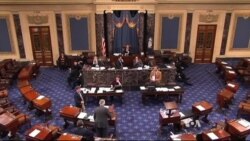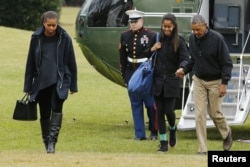President Barack Obama arrived back in Washington Sunday after a two-week vacation in Hawaii, his home state.
The political landscape in Washington will change for Obama this week, as Republicans take control of the U.S. Senate when a new Congress convenes. Now with majorities in both houses of the legislature following November elections, Republicans face a dual task - advancing their core beliefs, while also working with the president, a Democrat, during his final two years in office.
Incoming Senate Majority Leader Mitch McConnell, speaking on CNN television Sunday, seemed to strike a conciliatory note by saying that just because Americans voted for a divided government (a Republican-controlled Congress and a Democratic president) it does not have to mean gridlock. McConnell said voters want compromise and progress on key issues.
Still, many Republican lawmakers are seen as eager to begin chipping away at many of the president's initiatives, among them the Affordable Care Act - commonly called Obamacare - that requires most Americans to purchase health care insurance.
Immigration
Many legislators also want to do away with Obama's new immigration policy that provides a gateway to U.S. citizenship for undocumented immigrants living in the country illegally. Also, under fire in Republican quarters is Obama's recent decision to restore diplomatic relations with Cuba, ending a half-century long policy of isolating the communist nation.
As lawmakers settle into Washington this week following the Christmas and New Year's holidays, the president will go on the road with a three-day visit to several U.S. cities to highlight his policies that Democrats say have contributed to America's economic recovery.
The theme of his travels will undoubtedly be a key element of his annual State of the Union address on January 20.
Analysts say Obama has been energized by his end-of-the-year actions on immigration policy and Cuban relations.
Dealing with Republican objections, Obama has made it clear that he will use his veto power to block any efforts aimed at scaling back his initiatives.
2016 election
However those battles play out in the coming year, Republicans, among them Senator-elect Ben Sasse, say they are already looking ahead to the next presidential contest.
“We need to demonstrate the ability to govern, but we also need to admit that the big challenges facing this country are not going to be solved in the next 24 months. We need to set the stage for a 2016 presidential election,” said Sasse, speaking on ABC’s This Week program.
Democrats, like Senator Chuck Schumer, are also pondering the next electoral cycle.
“If we put together a strong economic message aimed at the middle class, not only will it unify our party, but we can actually do really well in 2016,” said Schumer, speaking on CNN’s State of the Union.
Observers point out that, traditionally, in presidential elections, a well performing economy gives an edge to the party in control of the White House.
Michael Bowman contributed to this report. Some information for came from AP and Reuters.







